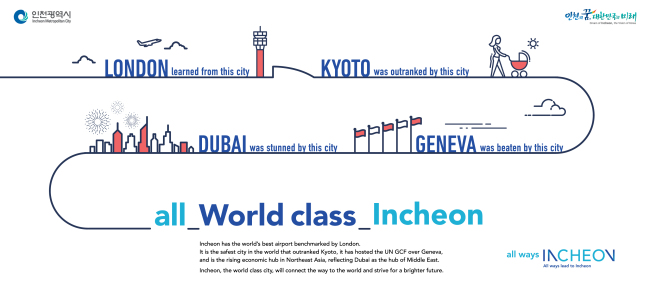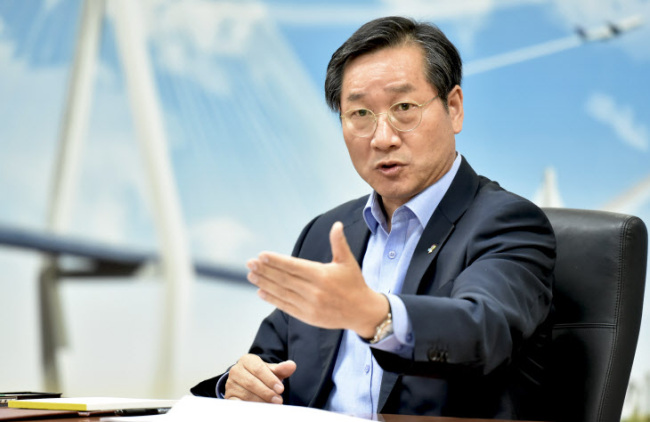Incheon, a city located 40 kilometers west of Seoul which boasts one of the most tech-savvy airports in the world, is recovering from massive debt to craft its status as an all-around player.
Led by Mayor Yoo Jeong-bok, who made sound city finance as his top priority, Incheon metropolitan government has carried out a 3-year debt resolution plan and is now seeing their efforts pay off.

An official poster that promotes Incheon’s city slogan, “All Ways Incheon.” Incheon Metropolitan Government
The city’s debt was estimated to be around 13 trillion won ($11 billion) in 2014, when Yoo took office, but that is now down to 11 trillion won this year. It is forecast to further scale down to 9 trillion won by the end of the year, according to the city officials.
Accordingly, the city’s debt ratio fell from 39.9 percent in 2015 to 24.1 percent this June, allowing it to avoid Interior Ministry sanctions. According to the city, its financial burden stemmed mainly from big-scale projects such as the 2014 Asian Games.
The city also repurchased municipal bonds worth 45.3 billion won in June for early redemption.
“Incheon will make efforts to reduce an additional 280 billion won worth of debt by the end of the year,” Yoo said during a recent interview.
The city government plans to evenly invest in the local social welfare, culture, education and environment sectors as soon as it achieves fiscal stability to promote the welfare of its citizens.
Solving its landfill issues was another core project Yoo has pursued throughout his term.
In 2015, the city obtained the license to own and manage a waste dump site spanning 15.8 square kilometers of land, shared with Seoul and Gyeonggi Province. The city is to earn waste commission fees worth 75 billion won per year.
The municipal and provincial governments were experiencing difficulties finding an alternative dumping ground for a site which was originally scheduled to shut down in 2016 due to pollution and bad odors. The site, which opened in 1992, caters to the needs of around 25 million citizens in Incheon and adjacent areas, according to government data.

Incheon City Mayor Yoo Jeong-bok talks of his achievements and goals three years into his term in an office interview. Incheon Metropolitan Government
Despite its global reputation as one of the best airline hubs, Incheon has been seeing sluggish developments in its land transportation. It is widely known that its commuters experience difficulties traveling from Incheon to another city.
Yoo revealed his dedication to the construction of high-speed underground rail networks, including the Incheon-bound GTX that connects Songdo International Business District in Incheon with central Seoul.
Suin Line, a subway line that connects Songdo Station to Incheon Station was also launched this month in an effort to grease its stiff inter-city transportation.
The expansion of its transportation infrastructure is in line with the city’s goals to promote its tourist sites and boost its regional economy.
The city is currently enhancing access to 168 nearby islands such as Yeongjongdo, which is expected to blossom into South Korea’s own Las Vegas with its proximity to Incheon airport. Its geographical advantage has successfully grabbed the attention of local and international resort and casino operators such as Paradise Group and Hong Kong’s Chow Tai Fook.
“My wish is to open an era of ‘great Incheon’ where citizens of the city can experience joy through integration of citizens and local development,” Yoo said.
“I also hope Incheon will be able to secure a power for sustainable development and morph into a city that can lead South Korea’s growth.”
Yoo’s four-year term is slated to end next year.
By Jung Min-kyung (mkjung@heraldcorp.com) and Lee Hong-seok (gilbert@heraldcorp.com)







